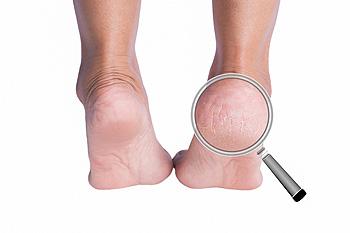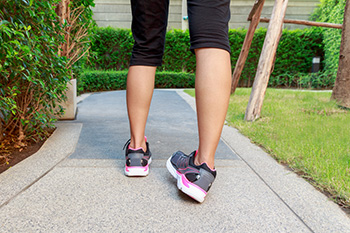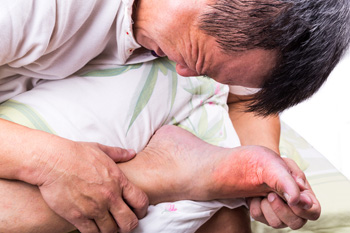
If you are someone that is prone to cracked heels, then you ought to be especially aware of the possibility of developing an infection because of this condition. Cracked heels occur when the skin covering the heel becomes severely dehydrated and fissures begin to form on the skin. As a result of these fissures, the skin might even start to bleed. Infections are an important risk to be aware of if you have cracked heels. Specifically, if an individual removes skin on the heels through a process known as debridement, an infection might occur. For example, if too much skin is removed with a razor, then the individual might be setting themselves up for a nasty infection. If you have cracked heels, it is suggested that you see a podiatrist promptly. This medical professional will be able to help you treat your condition and answer any questions you might have.
If the skin on your feet starts to crack, you may want to see a podiatrist to find treatment. If you have any concerns, contact one of our podiatrists from Lovely Foot Associates, PC. Our doctors can provide the care you need to keep you pain-free and on your feet.
Cracked Heels
It is important to moisturize your cracked heels in order to prevent pain, bleeding, and infection. The reason cracked heels form is because the skin on the foot is too dry to support the immense pressure placed on them. When the foot expands, the dry skin on the foot begins to split.
Ways to Help Heal Them
Ways to Prevent Cracked Heels
If you are unsure how to proceed in treating cracked heels, seek guidance from a podiatrist. Your doctor will help you with any questions or information you may need.
If you have any questions, please feel free to contact our office located in Johnstown, PA . We offer the newest diagnostic and treatment technologies for all your foot care needs.

Although it might not seem immediately obvious, the kinds of shoes that you wear can have a discernible impact on the health of your feet. For example, if you wear non-supportive, flimsy footwear, this can spell trouble for the strength and resilience of your feet. High heels are one such kind of potentially detrimental footwear. The impact that high heels can have on your feet and body is sometimes referred to as high heel syndrome. As a result of overuse of high heels, an individual might experience anatomical changes in their legs. Typically these individuals will have Achilles tendons that are more stiff. When an individual is experiencing high heel syndrome, they may benefit significantly from stretching exercises that target the calves. If you are someone who wears high heels frequently, consider contacting a podiatrist for more information and support.
High heels have a history of causing foot and ankle problems. If you have any concerns about your feet or ankles, contact one of our podiatrists from Lovely Foot Associates, PC. Our doctors can provide the care you need to keep you pain-free and on your feet.
Effects of High Heels on the Feet
High heels are popular shoes among women because of their many styles and societal appeal. Despite this, high heels can still cause many health problems if worn too frequently.
Which Parts of My Body Will Be Affected by High Heels?
What Kinds of Foot Problems Can Develop from Wearing High Heels?
How Can I Still Wear High Heels and Maintain Foot Health?
If you want to wear high heeled shoes, make sure that you are not wearing them every day, as this will help prevent long term physical problems. Try wearing thicker heels as opposed to stilettos to distribute weight more evenly across the feet. Always make sure you are wearing the proper shoes for the right occasion, such as sneakers for exercising. If you walk to work, try carrying your heels with you and changing into them once you arrive at work. Adding inserts to your heels can help cushion your feet and absorb shock. Full foot inserts or metatarsal pads are available.
If you have any questions please feel free to contact our office located in Johnstown, PA . We offer the newest diagnostic and treatment technologies for all your foot and ankle needs.

A twisted ankle is the most common cause of torn ligaments, also called ankle sprains. The foot rolls under and over-stretches the ligament that helps to stabilize the ankle joint. This can occur while stepping off a curb, landing on the foot wrong while walking or running, or playing sports where a lot of running and jumping are involved. Symptoms of an ankle sprain include pain, bruising, a loose feeling in the joint, and difficulty bearing weight. The incident may have generated a popping sound, and the ankle may begin to swell. The first way to deal with a sprained ankle is to cease the activity. Depending on the severity of the sprain, you may wish to see a medical professional, such as a podiatrist, as soon as possible. In the meantime wrapping the ankle to keep down the swelling, keeping it elevated, and applying ice is a good stopgap measure. It is exceedingly important to allow an ankle sprain to heal completely. If this is ignored, the chances are that the ankle will be re-injured, and sprains may become a chronic condition. For more information about an ankle sprain, please consult a podiatrist for an exam and long term treatment plan.
Although ankle sprains are common, they aren’t always minor injuries. If you need your ankle injury looked at, contact one of our podiatrists from Lovely Foot Associates, PC. Our doctors can provide the care you need to keep you pain-free and on your feet.
How Does an Ankle Sprain Occur?
Ankle sprains are the result of a tear in the ligaments within the ankle. These injuries may happen when you make a rapid shifting movement while your foot is planted. A less common way to sprain your ankle is when your ankle rolls inward while your foot turns outward.
What Are the Symptoms?
Preventing a Sprain
Treatment of a Sprain
In many cases, the RICE method (Rest, Ice, Compression, and Elevate) is used to treat ankle sprains. However, you should see a podiatrist to see which treatment option would work best with your injury. In severe cases, surgery may be required.
It is important to ask your doctor about rehab options after you receive treatment for your injury. Stretching, strength training, and balance exercises may help the ankle heal while also preventing further injury.
If you have any questions, please feel free to contact our office located in Johnstown, PA . We offer the newest diagnostic and treatment technologies for all your foot care needs.

If your big toe is red, swollen, and radiating extreme pain, you may have developed a case of gout, which is a form of arthritis. Gout occurs when the body contains too much uric acid. This acid forms crystals that collect in the joints, commonly the first metatarsophalangeal (MTP) joint of the big toe. This results in inflammation that swells and reddens the skin around the joint. The pain usually starts in the morning and increases throughout the day. It can come on suddenly, and it can be quite severe. Gout also can cause stiffness in the MTP joint, which may make it difficult to walk. If gout is not treated immediately, it can become chronic and spread to other joints, such as the ankles, knees, fingers, and wrists. A podiatrist can prescribe medications and suggest lifestyle changes that can help to reduce the flare ups of gout. If you have been experiencing the symptoms of gout on a regular basis, it is wise to seek the help of a podiatrist immediately.
Gout is a painful condition that can be treated. If you are seeking treatment, contact one of our podiatrists from Lovely Foot Associates, PC. Our doctors will treat your foot and ankle needs.
What Is Gout?
Gout is a form of arthritis that is characterized by sudden, severe attacks of pain, redness, and tenderness in the joints. The condition usually affects the joint at the base of the big toe. A gout attack can occur at any random time, such as the middle of the night while you are asleep.
Symptoms
Risk Factors
Prior to visiting your podiatrist to receive treatment for gout, there are a few things you should do beforehand. If you have gout you should write down your symptoms--including when they started and how often you experience them, important medical information you may have, and any questions you may have. Writing down these three things will help your podiatrist in assessing your specific situation so that he or she may provide the best route of treatment for you.
If you have any questions, please feel free to contact our office located in Johnstown, PA . We offer the newest diagnostic and treatment technologies for all your foot care needs.